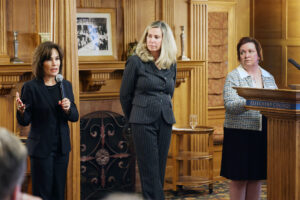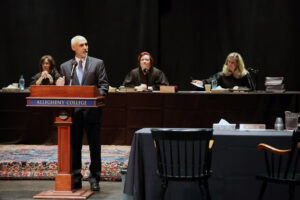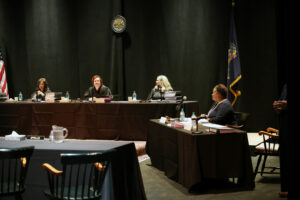Pennsylvania Superior Court Holds Historic Session at Allegheny College, Judge Murray Highlights Civic Role of Judiciary

On Tuesday, October 1, Allegheny College hosted the Pennsylvania Superior Court, hearing oral arguments for several cases, as well as hosting a lecture by Judge Mary Murray, Judge Maria McLaughlin, and Judge Megan McCarthy King about the court’s civic purpose.
The court’s visit to Allegheny College provided the institution with a special distinction. Although the court periodically travels to hear oral arguments, those proceedings typically happen at local courthouses. Seldom do colleges or universities host the court.
College President Ron Cole invited the court to campus earlier this year as part of Allegheny’s institutional commitment to promote civic learning and civic engagement. The college’s Center for Political Participation (CPP) has taken a leading role in connecting the court’s visit to several Allegheny courses, including courses in political science, psychology, communication and media, and education studies. The CPP has also been working with partners at Meadville Area High School and Active Aging to promote the court’s visit and make it more accessible to the community beyond the college.

“It was a unique privilege for our College to host the Pennsylvania Superior Court and to welcome the honorable panel of judges to share their insights on the vital role our courts play in civic life,” said President Ron Cole, Ph.D. “This unique opportunity reflects our commitment to fostering a deeper understanding of the judicial process and encouraging our students and community to engage meaningfully with the foundations of democracy. We are proud to provide a space where education meets civic responsibility, inspiring future leaders to uphold the values of justice and service.”
The court’s visit to Allegheny College provided residents of Crawford County, including Allegheny students, a unique opportunity to see the court in action. The Superior Court generally hears cases in Harrisburg, the state capital, but it also travels periodically to hear cases across the state. This provides residents from different regions the opportunity to observe an important part of the judiciary.

“We take our commitment to civic life very seriously at Allegheny College, and we are incredibly fortunate to host the Superior Court on our campus,” said Andrew Bloeser, the director of the Center for Political Participation. “It is an honor to help support the civic purpose of the court and to make the court’s proceedings more accessible to our students and to the broader community. Not many colleges get this opportunity.”
The Superior Court of Pennsylvania is one of the commonwealth’s two intermediate appellate courts. Established in 1895, the court is made up of 15 judges and handles criminal, civil, and family cases that are appealed from lower courts such as the Courts of Common Pleas.
Although decisions from the Superior Court generally receive less news coverage than the state’s Supreme Court, it remains the statewide court with which an average Pennsylvanian is most likely to interact. Cases involving child custody, probation and parole, and business disputes can all end up in front of this court. While those cases can be reversed by the state Supreme Court, this rarely happens in practice.

Following two sessions of oral arguments, Judge Mary Murray provided remarks about how the Superior Court contributes to the civic foundation of the state. That presentation counted as continued legal education (CLE) for members of the Pennsylvania Bar Association and was attended by members of the Allegheny community, including students from courses that observed oral arguments. Additionally, students had the opportunity to interact with judges serving on the court throughout their court’s time on campus, including a breakfast with judges prior to oral arguments and a reception and dinner at the end of the day.